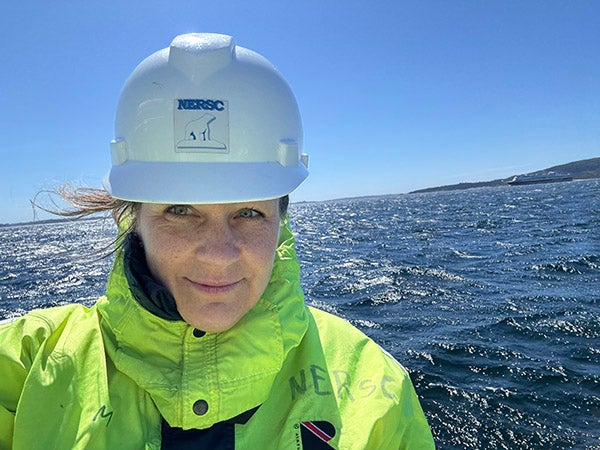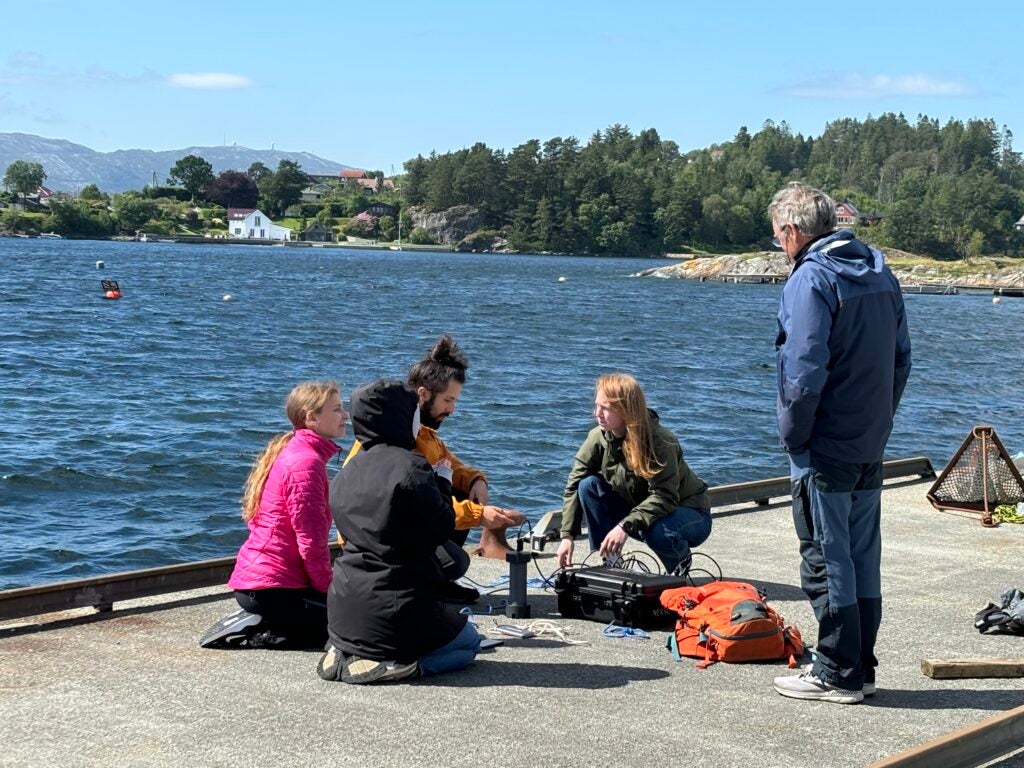Dramatic changes have been observed in the Arctic Ocean in the past decades in terms of ocean temperature and salinity structure and ice-cover. Because sound travels long distances underwater, scientists have been able to use acoustic signals to localize oceanographic platforms and vehicles underwater and ice, but the way sound travels depends on the oceanography.

Associate professor Lora Van Uffelen is director and founder of the Ocean Platforms, Experiments & Research in Acoustics lab at University of Rhode Island. The lab develops algorithms for geo-positioning autonomous underwater vehicles that consider the oceanography and the physics of sound propagation. The lab, formed in fall 2017, is in the URI Department of Ocean Engineering, one of the oldest and most well-respected ocean engineering programs in the country. Acoustics can be used to observe the ocean interior remotely.
The Nansen Environmental Remote Sensing Center in Bergen, Norway, has been performing large scale ocean acoustic experiments to study Arctic temperature structure and has deployed low-frequency sound sources that can be used for geo-positioning. Sound propagation in the Arctic Ocean is complicated by the unique and changing sound-speed structure and presence of ice, which makes the acoustic propagation less predictable and the geo-positioning more challenging.
The center’s work closely aligns with the research Van Uffelen performs. Hanne Sagen, the group leader for acoustics and oceanography at the center, invited Van Uffelen to present her past findings on acoustic propagation in the Beaufort Sea in a special session on Polar Underwater Acoustics at the International Conference on Underwater Acoustics in Southampton, England, in June 2022. Van Uffelen was subsequently invited to collaborate with scientists at the center, and in fall 2022, Van Uffelen hosted Sagen and several colleagues from NERSC for a one-day workshop at URI’s Narragansett Bay Campus.

The Useful Arctic Knowledge project, funded by the Research Council of Norway, contributes to the Arctic component of the United Nations’ Ocean Decade, with a goal to strengthen the quality of education, research and innovation in ocean observing technology through partnership between Norway, Canada, and the U.S. Partners in this initiative include NERSC, University of Norway Bergen, URI, Scripps Institute of Oceanography at the University of San Diego, and Universite Laval Takuvik Joint International Lab in Canada. These partnerships allow an exchange of information on observational data in the Arctic, which is critical to understanding the environmental impacts of a changing Arctic.
“It is so important to collect observational data. This project aims to improve data collection strategies and to train future generations of scientists and engineers in Arctic observation techniques and technologies,” said Van Uffelen, a recipient of numerous Office of Naval Research grants.
This partnership led Van Uffelen to a six-month sabbatical in Norway last year to further strengthen research ties between the center and URI, and between Norway and the United States in general. While there, she worked with Norwegian colleagues on acoustic propagation in the Arctic and underwater geo-positioning. She presented at an international workshop for Central Arctic Ocean Research Infrastructures in Tromso, discussed Enabling Technologies for Ocean Observing Systems in Stavanger, and gave a seminar at the Norwegian University of Science and Technology in Trondheim. She also co-chaired a session with NERSC colleague Espen Storheim on polar acoustics at the International Conference on Underwater Acoustics in Bath, England, in June.
Prior to the conference, she and Storheim taught a short course and field camp on environmental acoustic measurements for Norwegian students as part of the UAK project. The course included deploying acoustic and oceanographic instrumentation in the Norwegian fjords and analyzing collected data. Van Uffelen is continuing collaborations with the center and they are planning a field deployment of profiling floats in the Arctic on the K/V Svalbard, a Norwegian Coast Guard ice breaker, in late summer 2025. The plan is to bring U.S. graduate students to join these research expeditions.
“I am excited to be a part of this project as it aligns well with my research interests and I look forward to ongoing fieldwork and collaboration,” said Van Uffelen. “Partnership with Norway allows us to expand our knowledge of and access to the Arctic and make significant impacts in research and education.”
The project is ongoing through 2027, with goals to further study underwater acoustics including communication, localization and positioning of floats and gliders, tomography, passive acoustics, and influence of sound on marine life and to train students in collecting and analyzing acoustic data in the Arctic. They will continue with a series of research schools in fjords and in the Arctic, as well as workshops and exchange visits between Norway, U.S. and Canada.
